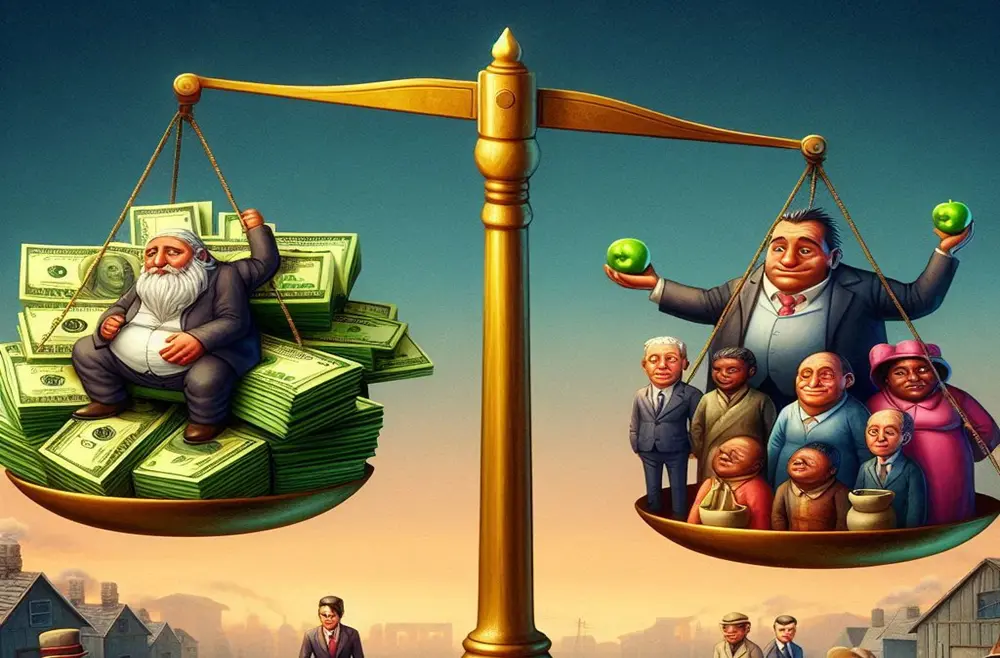Income inequality, the growing divide between the wealthy and the rest of society, has become a critical issue in many economies. As the gap widens, it poses significant challenges to social mobility, and the ability of individuals to improve their socioeconomic status. This disparity limits access to essential resources like education, healthcare, and housing, trapping many in a cycle of poverty.
Understanding the impact of income inequality on social mobility is key to addressing the broader issues of economic and social justice in modern society.
In this article, we will discuss income inequality and its impact on social mobility. We will also explore how economic inequality affects society as a whole. In the last section, we will present you with 10 solutions to fight income inequality. So let’s get started!

The Impact of Income Inequality on Social Mobility
Income inequality, the widening gap between the rich and the poor, has become a defining issue in modern economies. Over the past few decades, the wealth of the top 1% has grown exponentially, while wages for the middle and lower classes have stagnated or even declined when adjusted for inflation. This disparity is not just a matter of economic imbalance; it has profound implications for social mobility, the ability of individuals to move up or down the socioeconomic ladder.
At its core, income inequality creates barriers to social mobility by limiting access to essential resources such as quality education, healthcare, and stable housing. For many families, especially those in lower-income brackets, the cost of sending a child to a good school or providing adequate healthcare can be prohibitive. This lack of access to foundational resources means that children born into poverty are more likely to remain in poverty, perpetuating a cycle that is difficult to break.
Education, often touted as the great equalizer, is one of the areas most affected by income inequality. In societies with high levels of inequality, there is often a significant disparity in the quality of education available to different socioeconomic groups. Wealthier families can afford private schooling or live in neighborhoods with well-funded public schools, while poorer families may be relegated to underfunded and overcrowded schools. This educational divide leads to differences in academic achievement, which in turn impacts future job prospects and earning potential.
Healthcare is another critical area where income inequality impacts social mobility. In countries without universal healthcare, access to medical services is often tied to income. Those with higher incomes can afford comprehensive health insurance and out-of-pocket expenses, while lower-income individuals may forgo necessary treatments due to cost. Poor health can significantly hinder an individual’s ability to work, pursue education, or take advantage of opportunities for advancement, further entrenching inequality.
Housing, too, plays a significant role in the relationship between income inequality and social mobility. The affordability crisis in many cities around the world means that lower-income families often live in substandard conditions or in areas with fewer opportunities for economic advancement. Additionally, the lack of affordable housing can lead to increased homelessness, which severely limits a person’s ability to find and maintain stable employment, further reducing social mobility.
The concentration of wealth at the top also affects social mobility by influencing political power and public policy. Wealthy individuals and corporations often have more influence over the political process, shaping policies that favor their interests. This can lead to tax policies, labor laws, and economic regulations that exacerbate inequality and make it harder for lower-income individuals to improve their circumstances. The resulting policies can create an environment where the rich get richer, and the poor struggle to make ends meet.
Furthermore, income inequality can lead to social unrest and a breakdown in social cohesion. When large segments of the population feel that they are being left behind or that the system is rigged against them, it can lead to frustration, resentment, and a loss of faith in democratic institutions. This social fragmentation can create an environment where it is even harder for individuals to climb the social ladder, as trust and cooperation within communities diminish.
The psychological impact of income inequality also cannot be overlooked. The constant comparison with wealthier individuals can lead to feelings of inadequacy, low self-esteem, and a sense of hopelessness among those in lower-income brackets. These feelings can discourage individuals from pursuing opportunities for advancement, as they may feel that the deck is stacked against them and that their efforts will not lead to meaningful improvement in their circumstances.
While some argue that a certain level of inequality is necessary to incentivize hard work and innovation, the current levels of income inequality in many countries have reached a point where they are doing more harm than good. When the rewards of economic growth are concentrated at the top, the majority of the population does not benefit, leading to a situation where social mobility is stifled, and the potential of many individuals is left unrealized.
Addressing income inequality is essential not just for promoting social mobility, but also for ensuring a more just and stable society. This requires comprehensive policy changes, including progressive taxation, investments in education and healthcare, and the promotion of affordable housing. By reducing inequality, we can create a society where everyone has the opportunity to succeed, regardless of their background.

How Does Economic Inequality Affect Society?
Economic inequality has profound and multifaceted effects on society, influencing various aspects of life and well-being:
Economic Instability: High levels of income inequality can lead to economic instability. When wealth is concentrated in the hands of a few, consumer spending, which drives economic growth, is reduced. This can result in slower economic growth, increased debt levels, and a higher likelihood of financial crises.
Health Disparities: Economic inequality is closely linked to health disparities. People in more unequal societies often experience poorer health outcomes, including higher rates of chronic diseases, mental illness, and lower life expectancy. The stress and lack of access to healthcare resources contribute significantly to these health issues.
Educational Inequities: Inequality affects educational opportunities, with children from lower-income families having less access to quality education. This perpetuates the cycle of poverty, as education is a key factor in improving socio-economic status. Inequitable education systems can lead to a less skilled workforce, impacting the overall economy.
Crime and Violence: Higher levels of inequality are often correlated with increased crime rates and violence. Economic disparities can lead to social tensions and a sense of injustice, which may result in higher incidences of crime as individuals resort to illegal means to improve their circumstances.
Political Polarization: Economic inequality can lead to political polarization and erode social cohesion. When wealth and power are concentrated among a small elite, it can result in policies that favor the wealthy, leading to disenfranchisement and distrust among the broader population. This polarization makes it difficult to achieve consensus on important issues.
Mental Health: The psychological impact of income inequality is significant. People in more unequal societies often experience higher levels of stress, anxiety, and depression. The constant comparison with wealthier individuals and the struggle to make ends meet can take a toll on mental health.
Social Cohesion: Inequality can weaken social cohesion and trust within communities. When there is a significant gap between the rich and the poor, it can lead to feelings of resentment and division. A cohesive society relies on a sense of fairness and shared purpose, which is undermined by high levels of inequality.
Economic Productivity: Inequality can also impact economic productivity. When a large portion of the population is unable to access education, healthcare, and other essential services, it limits their ability to contribute effectively to the economy. This underutilization of human potential can hinder overall economic growth.
Public Services: Income inequality affects the quality and availability of public services. In more unequal societies, there is often less investment in public goods such as healthcare, education, and infrastructure. This can lead to a decline in the quality of life for the majority of the population, further entrenching inequality.
Intergenerational Poverty: Income inequality often leads to intergenerational poverty, where the economic disadvantages of one generation are passed down to the next. This perpetuates a cycle of poverty and limits opportunities for future generations to improve their socio-economic status.
Global Implications: On a global scale, economic inequality can exacerbate international tensions and contribute to global instability. Countries with high levels of inequality may experience more social unrest and conflict, which can have ripple effects on global peace and security.
Promoting economic equality is crucial for creating a more stable, healthy, and cohesive society. By implementing policies that promote fair distribution of wealth and opportunities, societies can mitigate the negative impacts of economic inequality and foster a more inclusive and prosperous future.
10 Solutions to Fight Income Inequality
Addressing income inequality requires a multifaceted approach that includes economic, social, and political reforms. By implementing these solutions, societies can work towards a more equitable and just future:
1. Raise the Minimum Wage
Raising the minimum wage is a powerful tool to combat income inequality. By increasing the earnings of the lowest-paid workers, it helps lift millions out of poverty and reduces the income gap. Higher wages can improve living standards, boost worker productivity, and stimulate economic growth as workers spend their increased earnings. Additionally, Increasing the minimum wage can narrow racial and gender pay disparities, benefiting marginalized communities disproportionately affected by low wages.
2. Progressive Taxation
Implementing a progressive tax system ensures that higher-income individuals pay a larger percentage of their income in taxes. This can help redistribute wealth and fund essential public services.
Implementing taxes on financial transactions and capital gains at rates comparable to earned income can also help. Additionally, closing tax loopholes and increasing IRS funding to enforce tax compliance are crucial steps. These measures can generate significant revenue, which can be reinvested in social programs, education, and healthcare, ultimately reducing the wealth gap and promoting economic equity.
3. Expand Social Safety Nets
Strengthening social safety nets is essential for addressing income inequality and ensuring economic stability for all. By broadening access to programs such as unemployment benefits, food assistance, and healthcare, we can provide crucial support to those in need. These programs help lift individuals and families out of poverty, reduce the poverty gap, and build resilience against economic shocks.
Moreover, expanding social safety nets supports marginalized communities, who are often disproportionately affected by economic hardships. By ensuring that everyone has access to basic needs and opportunities, we promote social equity and economic mobility.
4. Invest in Education
Education is a key driver of social mobility and can help reduce long-term inequality. By ensuring access to quality education from early childhood through higher education, we can equip individuals with the skills and knowledge needed to succeed in the workforce. This not only enhances economic mobility but also reduces the wealth gap by providing equal opportunities for all, regardless of their socio-economic background. Moreover, education fosters critical thinking and innovation, driving long-term economic growth and social progress.
5. Universal Healthcare
Universal healthcare is a crucial strategy for combating income inequality. Providing access to essential health services for all, regardless of income, ensures that everyone can receive the care they need without financial hardship. This reduces the burden of medical expenses on low-income families, preventing them from falling into poverty due to healthcare costs. Additionally, universal healthcare promotes overall health equity, enabling individuals to lead healthier lives and participate more fully in the economy, thereby narrowing the income gap.
6. Affordable Housing
Affordable housing is a critical component in the fight against income inequality. Implementing policies that promote affordable housing can help reduce the cost burden on low-income families, allowing them to allocate more resources to other essential needs like education and healthcare.
Affordable housing also promotes economic mobility by providing a stable environment for children to grow and learn, which can lead to better job opportunities in the future. Additionally, it helps to prevent homelessness and reduces the risk of displacement, fostering more equitable and inclusive communities.
7. Support for Small Businesses
Supporting small businesses is a vital strategy to fight income inequality in society. Small businesses create jobs, foster innovation, and stimulate local economies, providing opportunities for economic mobility. By offering grants, low-interest loans, and tax incentives, governments can help small businesses thrive, especially in underserved communities. Additionally, providing access to training and resources can empower entrepreneurs from diverse backgrounds, promoting inclusive growth and reducing the wealth gap.
8. Strengthen Labor Rights
Protecting workers’ rights to unionize and collectively bargain can help ensure fair wages and working conditions, reducing the gap between the rich and the poor.
Stronger labor rights also help reduce wage disparities, particularly for marginalized groups, by providing a platform for addressing discrimination and promoting pay equity. Additionally, robust labor protections can lead to more stable employment and economic security, ultimately narrowing the income gap and fostering a more equitable society.
9. Financial Regulation
Implementing stricter regulations on financial markets can prevent excessive risk-taking and ensure that the financial system benefits everyone, not just the wealthy. By enforcing transparency and accountability, we can prevent market abuses and reduce the risk of financial crises that disproportionately affect low-income individuals. Strengthening oversight of financial products, such as derivatives, can protect consumers from predatory practices.
10. Promote Inclusive Growth
Promoting inclusive growth involves creating economic opportunities that benefit all segments of society, particularly marginalized and low-income groups. Policies such as investing in education, healthcare, and infrastructure can enhance access to resources and opportunities. By focusing on inclusive growth, we can build a more resilient economy where everyone has the chance to thrive, thereby reducing the wealth gap and promoting social equity.
Conclusion:
Income inequality is a significant social problem because it has various adverse effects on society. It can hinder economic growth, reduce social cohesion, and increase political polarization. When wealth is concentrated in the hands of a few, it limits opportunities for the majority, exacerbating poverty and reducing access to essential services. This disparity can also foster social unrest and undermine the principles of fairness and equality, which are fundamental to a just society.
Tackling the economic inequality issue requires a multifaceted approach, including policy reforms that ensure equitable access to education, healthcare, and housing. By reducing economic disparities, we can create an environment where everyone has the chance to succeed, regardless of their starting point, fostering a more just and cohesive society.
Author: Mahtab Alam Quddusi





